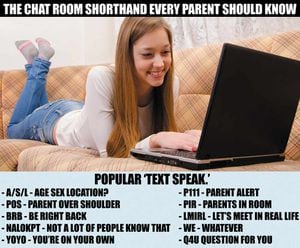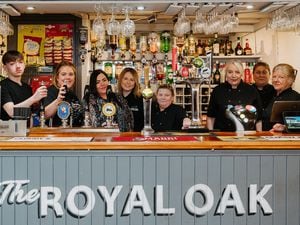Parents urged to learn online codes to keep young safe
It is a different language that exists in a virtual world – and a universe away from the lives of the average adult. But today parents were urged to get to know how their children communicate to ensure they remain safe.

Adults who have only just grasped the meaning of LOL may be shocked to discover it is just one example of a whole new way of speaking being used by teenagers online.

Hundreds of abbreviations and codes are being used by young people to communicate with friends and strangers in the virtual realm.
The meaning of the screenspeak used on Blackberry Messenger, Facebook chat, texts and chat rooms like Instagram is aimed at appearing to be gobbledegook to the prying eyes of parents.
For example P911 means Parent Alert, MBM means Mum Behind Me, ASL means Age, Sex, Location? and RUS means Are You Single?
It is a fast and exclusive way for young people to talk privately without worrying about adults reading over their shoulder or checking their history.
And the vast majority of conversations are little more than meaningless gossip among friends. But paedophiles are learning the new language and can use it to pose as children to target victims.
It is a risk that remains low, but one that parents are being urged to know about.
Some schools across Shropshire and Mid Wales have set up workshops for parents, informing them of the virtual world their children inhabit.
Alan Morris, head of middle school at Abraham Darby Academy in Madeley, said: "Kids have created this language over time. They've always had little codes and ways of saying things. They can be very sneaky.
"But there's a generation gap that means younger parents probably know a lot of it but if you are more mature parents you are not going to have a clue.
"I think it might be worthwhile putting some information together about these abbreviations and telling parents where they can find their meanings so they know what to look out for.
"It's about safety it's about knowing who they are talking to and what they are up to.
"Children know more about using a computer than we do. We want them to communicate in their own ways it does make them lazy though as these abbreviations are being put in the middle of essays."
"I am just preparing another programme for our year sevens about keeping safe online and these codes are one of the things it is going to look at."
Neil Stonehouse, principal of The Phoenix Academy in Dawley, said: "Like everything else we need to educate children to make sure they are managing their literacy appropriately.
"Our philosophy has always been for children to be open with parents on what they do online but also for parents to be aware and monitor what they are doing.
"We have a full programme on e-safety education at this academy. We have a member of staff appointed to monitor that."
Investigators from the Child Exploitation and Online Protection Centre today warned that children as young as eight have been targeted by adults posing as youngsters and using the code language to make themselves convincing. In extreme cases some have persuaded children to act inappropriately and then blackmailed them when they have threatened to go to the authorities.
In the past two years across 12 investigations, 424 children worldwide have been blackmailed in this way, 184 were from the UK, Ceop said.
Ceop operations manager Stephanie McCourt said: "First of all it's the English language. They are able to threaten the children if they can communicate to them. English is a really popular universal language and the use of codes simply strengthens trust between those online.
"Second, offenders have actually said that because they perceive the UK as a free, open and liberal society, they think they will have more success in targeting UK children."
Ceop deputy chief executive Andy Baker said: "Children as young as eight are being targeted. Offenders often have the mistaken impression that they can hide themselves online, they can use the anonymity that they perceive the internet affords them. That is not true."
John Carr, a government advisor on online child safety, added: "These people are very skilled liars and manipulators. They search for children who are looking for friendship. These children are vulnerable and the offenders know that, that's why they go after them."
Parents with concerns can contact the NSPCC helpline on 0800 328 0904, or police. Reports of abuse can also be made at the Ceop website www.ceop.police.uk





